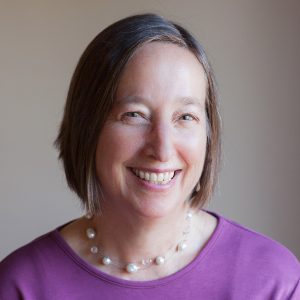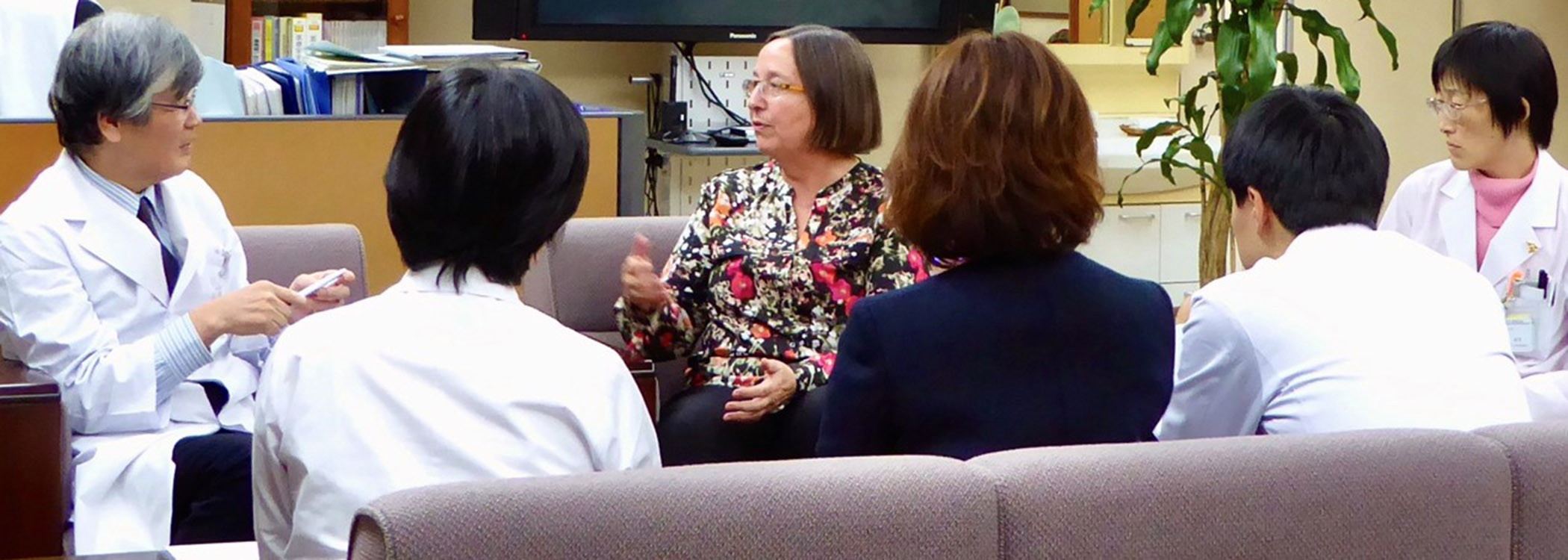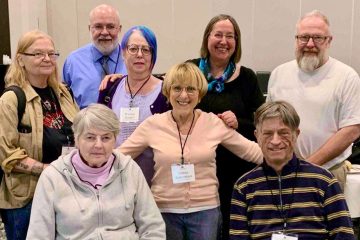
Carolyn Canfield
When Carolyn Canfield listens to new medical students explain what constitutes a good doctor, she finds the depth of their views on illness and health care encounters remarkable and often very moving.
Some medical students say they are motivated by their own experience in dealing with grave medical situations, or that of family members. Other students are inspired by observing a doctor offer exceptional care to patients and their communities.
“Medical students arrive really sensitized to the patient need for careful and kind care, and they’re hungry for that perspective to be interwoven with the medical knowledge, expertise, skills and understanding they expect from medical school,” says Canfield, an adjunct professor in UBC’s department of family practice. “Expanding student access to the wisdom and diversity of patients within the learning environment equips future doctors with a relational foundation for their careers ahead.”
As the first patient appointed to faculty at UBC without formal training in the health sciences, Canfield teaches patient safety and leadership to first year medical and nursing students. She also works across Canada and internationally to expand opportunities for patients, caregivers and communities to partner with health care professionals to improve health services, systems, research, training and governance.
She identifies collaboration as the key to necessary mutual respect and awareness for trust to flourish, thereby opening a generous exchange of knowledge. Building better health care together also generates accountability and public awareness.

Canfield meets with clinicians and the chief executive at Osaka University Hospital, Japan, 2016.
She advocates globally for opportunities for patients to come into classrooms and labs to talk with trainees about experiences with health care and the communities in which they live. When hearing directly from patients about their invisible obstacles and their innovations, ambitions, courage and frustrations, students learn how to bring deep humility and sensitivity to recognize the many facets of being a patient.
I think partnership with patients is a mindset that can span the careers of health professionals whether they head towards research or delivering care. Patient partners are an asset in the classroom, the lab and the clinic. We add to physician capacity and reach by offering skills and insights that can’t be found elsewhere.
Carolyn Canfield
To expand the impact of her work, Canfield has donated to the UBC Faculty of Medicine to create the Canfield Distinguished Scholar in Patient Partnerships at UBC. Her intention is to augment UBC’s leadership and scholarship in the field of patient and community partnerships in health care.
“I hope this position can draw together a more accurate picture of where we are now and where we need to go,” says Canfield. “This appointment raises the profile of the topic and is a way to highlight the priorities of the Faculty of Medicine in their relationship to the people of British Columbia and advance the work.”

Canfield with other patient partners at the annual conference of the Canadian Association for Health Services and Policy Research, Halifax, Nova Scotia, 2019.
UBC is a world leader in patient and community participation in health professional education. The Patient and Community Partnership for Education (PCPE) in UBC Health facilitates patient involvement in interdisciplinary education, research and health systems. The PCPE also conducts research that examines and evaluates the impact of patient engagement on health professional learning, the interaction between students and patients, and how these experiences can affect future health outcomes.
The Canfield Distinguished Scholar in Patient Partnerships at UBC will strengthen the partnership between the PCPE and UBC’s Centre for Health Education Scholarship (CHES). This centre is at the global forefront of research and capacity-building that supports health care providers to learn and health professions educators to teach, toward enhancing the health of people and populations. The partnership between PCPE and CHES will further our understanding of how patients interacting with students early in their careers can support more compassionate, high-quality care.
“My donation is a contribution that’s within my capacity, and I believe it will stimulate others’ generosity. I hope it becomes a beacon for philanthropy in this field,” says Canfield. “There is so much potential ahead.”
Her contributions to patient and community partnerships locally and globally are remarkable, but arose from a tragedy of unintended medical harm: the unexpected death of her husband after successful surgery in 2008. Stunned by a complete disinterest in learning from failures in his care, Canfield took up the label “citizen-patient” to explore how she might support trust between patients and providers, even when outcomes aren’t optimal. Finding a role in health professional education at UBC has been deeply gratifying for Canfield.
“What I’ve learned over the past 14 years is that unhappy care experiences arise most often from unmet expectations,” says Canfield. “This might be due to missing or misunderstood information, or even mistrust, on both sides. Open and candid conversations to build trust and respect have a massive impact on the course of patient-provider relationships and outcomes, throughout an episode of care. This is something we can work on to benefit all parties.” She notes that trusted, seamless communication is especially critical in team-based care.
“Patients literally embody all the health disciplines. Collectively, our bodies encompass the complexity of longitudinal care with all its multi-faceted impacts, over all ages and stages of life, across geography and within every expression of human diversity,” says Canfield.
“Health care isn’t something you can deliver like a product off an assembly line; it’s a partnership, a nuanced personal relationship. The contribution of patients to the clinical relationship is necessary, like the other hand clapping. If we share the experience of health care together—patients, caregivers, our wider communities and practitioners—medical doctors will find the rewards of professional meaning and satisfaction.”
For more information about supporting patient and community partnerships at the UBC Faculty of Medicine, please contact Lisa Slater at lisa.slater@ubc.ca.